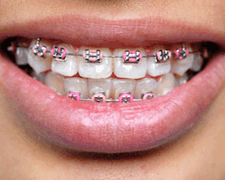المقالات
Adult

Until the 1980s, a steel band went around each individual tooth like a ring. The wire that pulled the teeth into line was attached to a little bracket that was on the front of the steel bands. You may remember what this looked like--a mouth full of metal!
Today, orthodontic treatment is different Fortunately, today these bands have been replaced with brackets that are bonded with an adhesive right to the front of the teeth. They're much more comfortable, smaller in size than an unpopped kernel of popcorn, and much less noticeable.
Clear brackets are also available, but they're usually more expensive and tougher to keep clean. A stainless steel or nickel titanium wire still connects the brackets, and different sizes provide the pressure to move the teeth. Elastics that now come in many different colors hold the wire in place. Special elastic bands may be added to speed up teeth movement.
A beautiful new smile How do braces move teeth? It's amazing how far orthodontic treatment can move teeth through bone. Your bone responds to the tension created by these brackets and wires by making special cells on each side of a tooth. These cells remove bone on one side of the tooth and make bone on the opposite side. That's what allows the tooth to move.
It's harder to clean your teeth once braces are on, so regular cleaning appointments are more important than ever. Permanent white stains or cavities may form on teeth if plaque isn't regularly removed. After treatment, retainers are used to hold the teeth in their new alignment. Some retainers are designed to be removable, while others are cemented in place.
